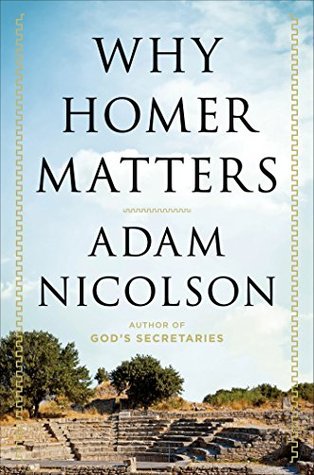More on this book
Kindle Notes & Highlights
Goethe thought that if only Europe had considered Homer and not the books of the Bible as its holy scripture, the whole of history would have been different, and better.
the Homeric epics were first written
These are the two possibilities for human life. You can either do what your integrity tells you to do, or niftily find your way around the obstacles life throws in your path. That is the great question the poems pose. Which will you be? Achilles or Odysseus, the monument of obstinacy and pride or the slippery trickster in whom nothing is certain and from whom nothing can be trusted? The singular hero or the ingenious man?
It is a disaster, fueled by the fear the Greeks had of the creatures of the sea, alien animals which, as Achilles taunts one of his victims, “will lick the blood from your wounds and nibble at your gleaming fat.” The
You know it by doing it again and again, never quite the same, never quite differently. You may even find, in that tiller-tweaking mobility—a slight adjustment here, another there—that you know things that the rigid and the fixed could never hope to know. The
Of about three thousand languages spoken today, seventy-eight have a written literature. The rest exist in the mind and the mouth. Language—man—is essentially oral.
if we do not enter the personal and moral life of the people who made it, unless we place ourselves at the very point in humanity which was theirs, so that we see and feel as they saw and felt; unless we watch them live, or better, unless for a moment we live with them?
This is the Renan effect, seeing the past for its strangeness, not imposing our own clarity or suppositions on something from the other end of human consciousness.
There are no oaths sworn between lions and men, nor do wolves and lambs come to some arrangement in their hearts. They are filled with endless, repetitive hate for each other. Just so, it is impossible for you and me to be friends, nor will there be any oaths between us till one or other is dead, and has glutted Ares, the god of war, who carries his tough leather shield, with his blood.
There is another remembered story of Odysseus, not in Homer, but recorded from Sophocles in some rough Latin notes of plays and myths which have otherwise disappeared. Telemachus, Odysseus’s son, is one month old when Palamēdēs, a messenger arrives from Agamemnon, instructing Odysseus to come to the war against Troy. Odysseus reacts as Achilles might, skeptically, reluctantly, and to escape the summons pretends to be mad. He takes a donkey and an ox, yokes them together on the same plow, as no man ever has or would, and when he has cut the first furrow he sows it not with seeds but with salt.
...more
As Odysseus approaches his son he turns the plow aside, bending the furrow away from his baby’s flesh, and by that swerve shows he is sane. He loves his son more than he loves himself, and so has no choice but to go and suffer at Troy. He takes with him a murderous loathing for Palamēdēs, the clever diplomat. In time Odysseus concocts accusations against him, that he is secretly colluding with the Trojans against the Greeks, and finally stones him to death as a liar and traitor.
Palamēdēs is Mediterranean man, the inventor of counting, money, weights and measures, jokes, dice, military ranks, the letters of the alphabet and the making of wine. He represents everything the south has to offer, including submission to an overall king in Agamemnon. He is, in his slickness, the enemy.
“Our land, compared with what it was,” Plato wrote famously of the Greece he knew, “is like the skeleton of a body wasted by disease.
the sky persists in a way that is outside time; nothing that is done on earth shares that eternity.
Homer then has the bard—a blind man whose name is Demodocus, which means “popular with the people”—say something that drives far into the center of what Homer means and why Homer matters: “The gods did this and spun the destruction of people / For the sake of the singing of men hereafter.” The song, this poem, this story, is the divine purpose of the war. The war happened so that the poem could happen.


